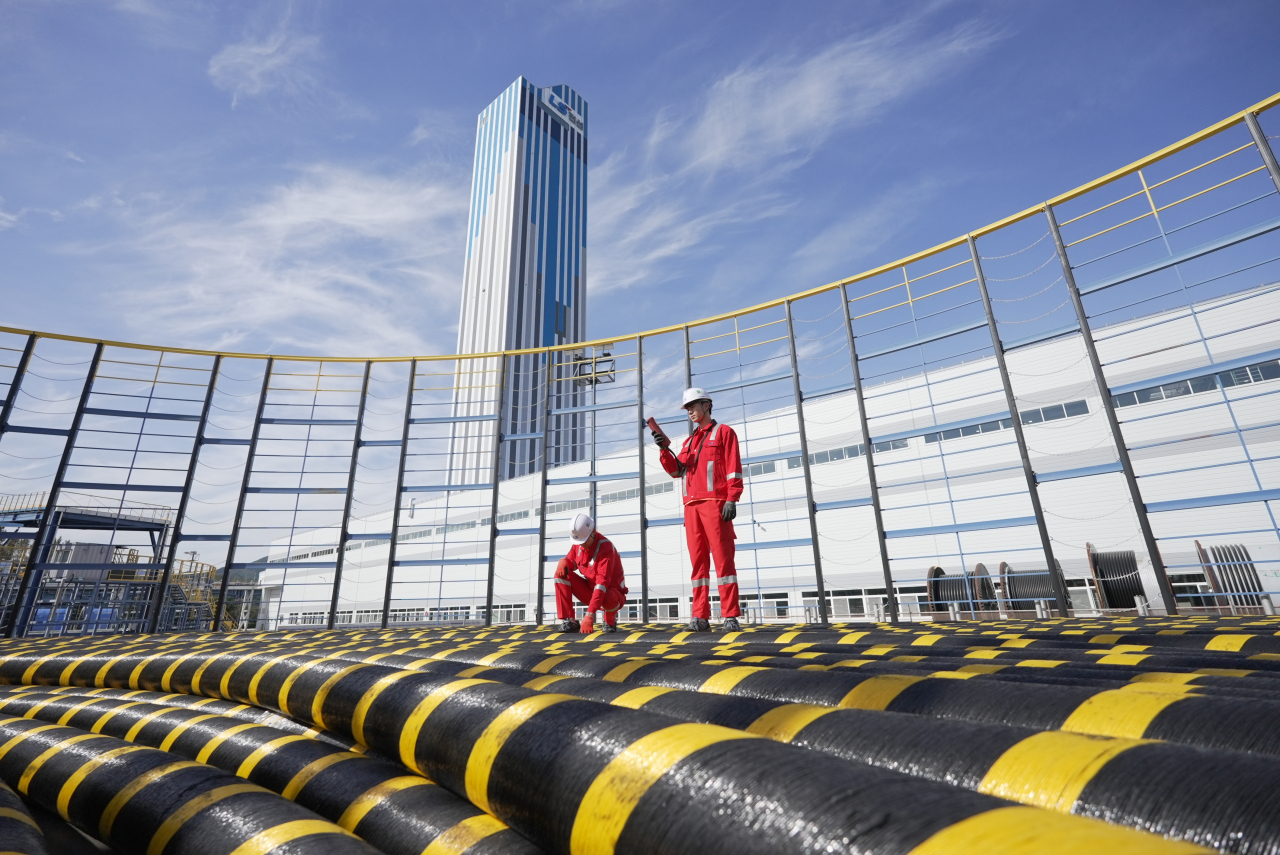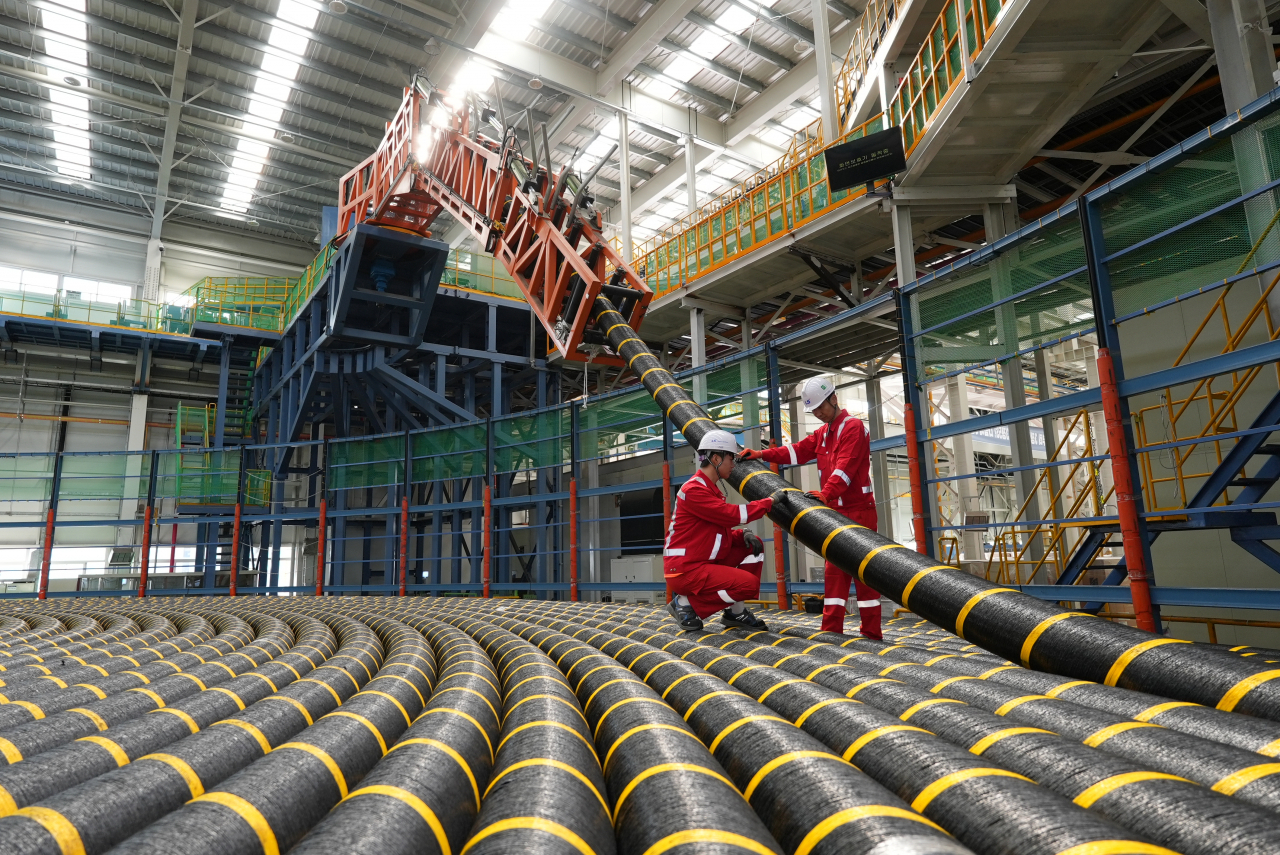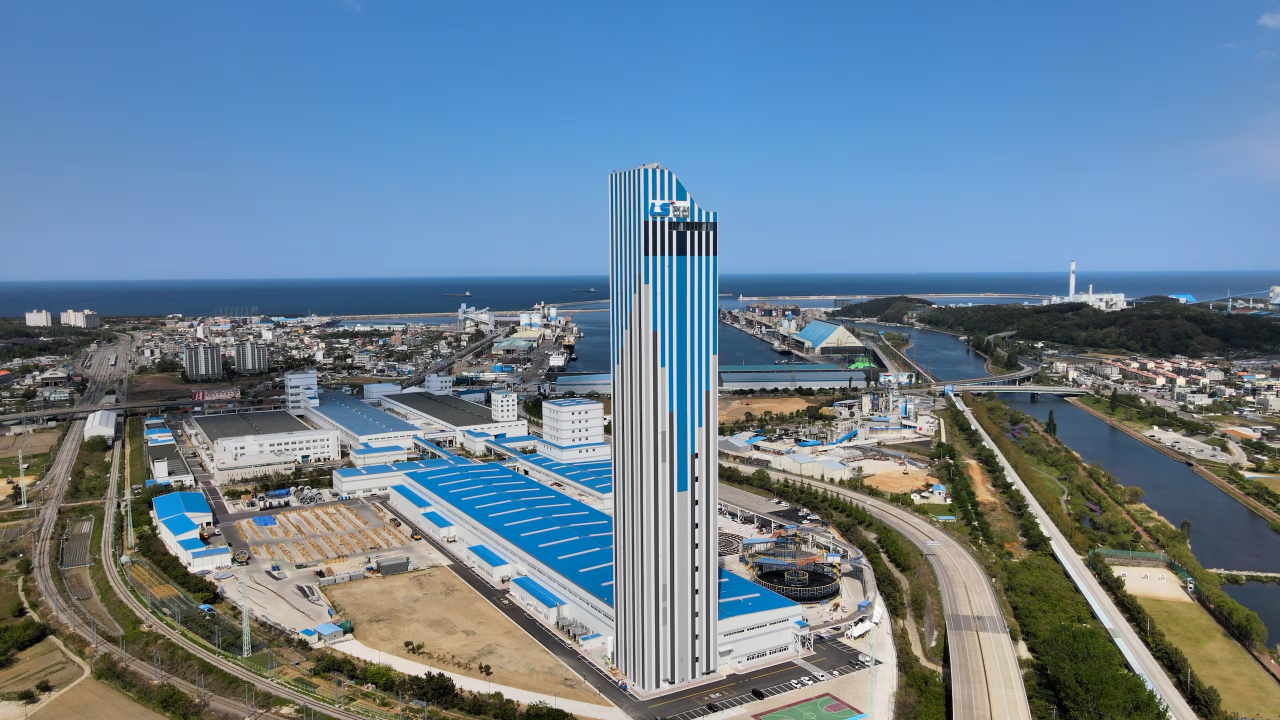 |
At the Donghae plant in Gangwon Province, engineers from LS Cable & System inspect cables wound on a cable drum, with Asia's largest 172m-tall vertical cable processing tower, standing in the background. (LS Cable & System) |
DONGHAE -- LS Cable & System, South Korea's leading cable manufacturer, showcased last Thursday its extensive line of undersea cable production facilities at its Donghae plant in Gangwon Province, aiming to more than double its yearly sales from undersea cables to 1 trillion won ($740 million) over the next five years, tapping into the global surge in demand for energy and power grids.
The plant is Asia's most expansive undersea cable production base. A gangway that resembles a train track connects the plant's four buildings, facilitating the cable's journey through a six-step process that leads to its transportation to Donghae Port, located adjacent to the factory.
From there, specialized vessels operated by LS Marine Solutions, a subsidiary of LS Cable acquired this May, ship and install the cables in destinations including Korea, Taiwan, and Vietnam.
Over the past decade, LS Cable & System has evolved from competing with European market-dominant companies to becoming the world's third-largest undersea cable manufacturer, trailing only Italy's Prysmian and France's Nexans.
This ascent is largely due to the company's success in localizing production lines with proprietary technology that can create reliable cables and its ability to produce high-performance, long-length undersea cables essential for renewable energy power grids.
 |
(LS Cable) |
"Temperature changes can play havoc with our machines, often leading to defects and resulting in the scrapping of all manufactured wires. But our expertise lies in preventing such defects from occurring," shared Kim Jin-seok, the head of the facility's production efficiency team.
The factory's cable drums that wind and transport the cables, which range in weight from 500 tons to 10,000 tons, are critical in determining the maximum cable length that can be manufactured. The Donghae plant sprawls across 270,000 square meters and is home to 30 cable drums, including the world's largest 10,000-ton drum capable of winding a cable up to 100 kilometers in length.
As of the first half of this year, LS Cable & System, alongside its subsidiaries, has amassed an order backlog totaling 3.79 trillion won ($2.8 billion), marking a 17 percent increase from the previous year's end.
"Our production lines were in full swing, running three eight-hour shifts even during the Chuseok holiday," added Kim.
The plant's high-voltage direct current transmission cables, or HVDC cables, are its high-value products with superior transmission efficiency. These cables are primarily manufactured at the new vertical continuous vulcanization tower, or VCV tower, a 172-meter-tall structure completed in May of this year.
 |
LS Cable's 172-meter-tall VCV tower in Donghae (LS Cable) |
With its towering stature, the VCV tower can produce kilometers of HVDC cables in a single go, making it the largest facility of its kind in Asia. HVDC cables minimize energy losses over vast distances, positioning the company to tap into the burgeoning demand from offshore wind farm companies.
The tower can be likened to a giant, vertical conveyor belt that wraps cables in protective insulation and administers a special heat treatment called vulcanization to reinforce the insulation.
Its vertical design also prevents explosion risks caused by small bubbles or foreign objects in the ultra-high voltage cables and ensures that the cables are molded evenly without sagging, resulting in consistent insulation distribution.
"This is crucial for the undersea cables to connect land to islands and transmitting power from offshore wind farms to supply power grids across countries and regions," Kim said.
Outside the tower, an endless stream of undersea cables, as thick as a human torso, progresses at a rate of 5 to 6 meters per minute towards Donghae Port, located approximately 700 meters away. Here, the cable-laying vessel GL2030, operated by LS Marine Solution, awaits its cargo.
The GL2030 is the only vessel in Korea equipped with a dynamic positioning system that uses radio or ultrasonic waves to maintain its position against external forces like currents or winds.
With its eyes on the global market, LS Cable & System is in the process of expanding its operations across Asia, Europe, and North America. The company is also exploring the possibility of establishing a local factory in Vietnam through its subsidiary, LS Cable & System Asia.
Moreover, the company is on the cusp of finalizing an investment decision to establish an undersea cable production plant in the US.
"Undersea cable construction is an intricate process. If something goes awry in the middle of a six-month project, we have to discard all three months of work and start from scratch. Therefore, the key differentiator in the US market will be our trust and experience," said Kim Hyeong-won, head of the Energy Business Division at LS Cable & System.







![[Weekender] Korea's traditional sauce culture gains global recognition](http://res.heraldm.com/phpwas/restmb_idxmake.php?idx=644&simg=/content/image/2024/11/21/20241121050153_0.jpg)